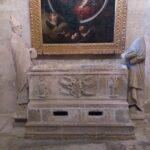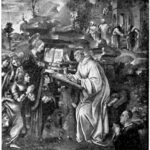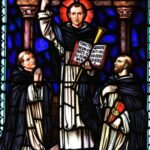St. Florian
Saint Florian
Saint Florian: The Brave Guardian of Fire
When they lived:
Saint Florian, whose legendary tale has been passed down through the centuries, is believed to have lived during the early 4th century. While the exact dates of his life remain uncertain, his legacy has persevered through the ages, making him an emblem of courage and protection.
Where they lived:
Saint Florian hailed from the Roman province of Pannonia, located in what is now modern-day Austria. He served as a high-ranking officer in the Roman army, stationed in the bustling town of Noricum, which was renowned for its strategic location and bustling trade routes.
Notable world events during the time of their life:
- The Tetrarchy and the Edict of Milan (301-313 AD): Saint Florian lived during a pivotal period in Roman history when Emperor Diocletian established the Tetrarchy, dividing the empire into four co-ruling regions. Persecution of Christians was rampant under Diocletian’s reign, leading to the Edict of Milan in 313 AD, which granted religious tolerance and ended the persecution of Christians, significantly impacting the spread of Christianity.
- The Great Fire of Rome (64 AD): Though Saint Florian lived several centuries after this event, the infamous Great Fire of Rome in 64 AD marked a significant moment in history. It led to widespread devastation and accusations against Christians, fueling early persecution of the faith that would affect Florian’s time as well.
- The Council of Nicaea (325 AD): In 325 AD, under the rule of Emperor Constantine, the First Council of Nicaea was convened. This landmark ecumenical council aimed to establish consensus within Christianity and resulted in the formulation of the Nicene Creed, a pivotal declaration of faith that helped shape the future of the Christian Church.
- The Split of the Roman Empire (285-395 AD): During Saint Florian’s life, the Roman Empire underwent a significant division into the Eastern Roman Empire and the Western Roman Empire. The intricate political landscape and ensuing conflicts impacted the daily lives of people across the empire, including Florian and his fellow Romans.
Their Patronage:
Saint Florian is widely revered as the patron saint of firefighters and firefighters, a fitting tribute given his legendary bravery and selflessness in rescuing people from fires. His courageous act of saving a town from a catastrophic fire has inspired countless generations of firefighters, making him their protective guardian and a symbol of hope during dangerous and challenging times.
Beyond firefighters, Saint Florian is also regarded as the patron saint of chimney sweeps, brewers, Austria, Poland, and those who face dangers related to water. His intercession is sought by many who confront perilous situations, and his feast day on May 4th is celebrated with fervor and gratitude for his unwavering bravery and protection.
Distinguished Soldier
Florian was born in 250 AD in the city of Aelium Cetium, present-day St. Polten, Austria. An ambitious and dedicated young man, he joined the Roman army. He was a good Christian and could work well with people.
Florian’s dedication to service was soon noticed by Diocletian, the Roman emperor at the time. He was appointed to an administrative position and moved ranks in the army at a relatively young age in a short time.
He became the commander of the imperial army in the Roman province of Noricum (the Celtic Kingdom).
In addition to his military duties, he leads the fire brigade. He organized and trained an elite group of soldiers whose sole responsibilities were to fight fires.
From every indication, Florian was a remarkable soldier.
The Death Decree
In 303, the Diocletianic persecution of Christians ensued. The Emperors of Rome, Diocletian, Maximian, Galerius, and Constantius, issued a decree prohibiting any religion other than Rome’s paganistic tradition. This tradition involves offering sacrifices to God.
Being a Christian in Rome during that era was dangerous. Defaulters under this decree were killed in many horrible ways. Many were burned; some were thrown into the wild.
The only way to avoid execution was by denouncing the Christian faith and participating in pagan traditions.
This edict spread throughout Rome and its territories, and every officer of the Roman Empire was expected to cooperate in carrying out these prohibitions.
But Florian wasn’t enforcing the proscriptions against Christians in the territory he oversees.
Drowned for His Faith
Reports got to Diocletian that Florian disobeyed his orders, and a man named Aquilinus was sent to investigate the reports. Aquilinus, following the traditions, asked Florian to offer sacrifice to the gods. And he refused.
When Aquilinus asked to know why he wasn’t following his orders, Florian replied, ‘Tell the emperor that I’m a Christian and will suffer the same fate as Christians.’ Surprised at his reply, Aquilinus tried swaying Flora with an offer of promotion. But he wouldn’t be enticed.
Scared that Florian might instigate rebellion among other Christians, Aquilinus ordered his death by burning.
Florian faced death without fear. When he was tied up at the pyre, Floridian challenged the soldiers, saying, “If you wish to know, I’m not afraid of your torture; light up the flame, and I will climb to heaven on the flames.”
Aqulinius, angered by his words, decided that instead of burning, Florians should be scourged and drowned.
It was the year 304; Florian was drowned at the Enns River with a rock tied around his neck. His body was later recovered by the Christians and appropriately buried at an Augustinian monastery near Lorch.
He is the patron saint of Linz, Austria, Poland, chimney sweeps, firefighters, and soap boilers.
5 Interesting Facts About St. Florian
- In his country, Austria, a town named Sankt Florian was named after the
saint. - Do you know that he is the patron saint of Poland? In 1184, Pope
Lucius 111 consented to Prince Casimir’s request for the relics of
St. Florian is to be sent to Krakow, Poland. - A different kind of soldier, loyal to his profession, couldn’t
hinder his faith, not even in the face of death. - Do you know May 4, his feast day, coincides with International Fire Day?
Fighters Day? Remember, he is the patron saint of firefighters. - Guess the fire code used in radio communications as a call sign for
fire stations and fire trucks in Austria and Germany? Yes, you
guessed right, “Florian.’
Prayer to St. Florian, Patron of Firefighters
Please Note:
This prayer of St. Florian is usually recited by firefighters, asking the intercession of their patron saint. Dear God, through the intercession of our patron, Saint Florian, have mercy on the souls of our comrades who have made the supreme sacrifice in the performance of their duty and on all who have gone before us after years of faithful discharge of their responsibilities, which now rest on ourselves. Give us the grace to prepare each day for our own summons to the tribunal of justice. Into Thy hands, O Lord, I commend my spirit; wherever Thou callest me,I am ready to go. Merciful Father of all men, save me from all bodily harm if it is thy will, but above all, help me to be loyal and true, respectful and honorable, obedient and brave. Thus fortified by virtue,I shall have no fear, for I shall then belong to Thee and shall never be separated from Thee. Amen.



